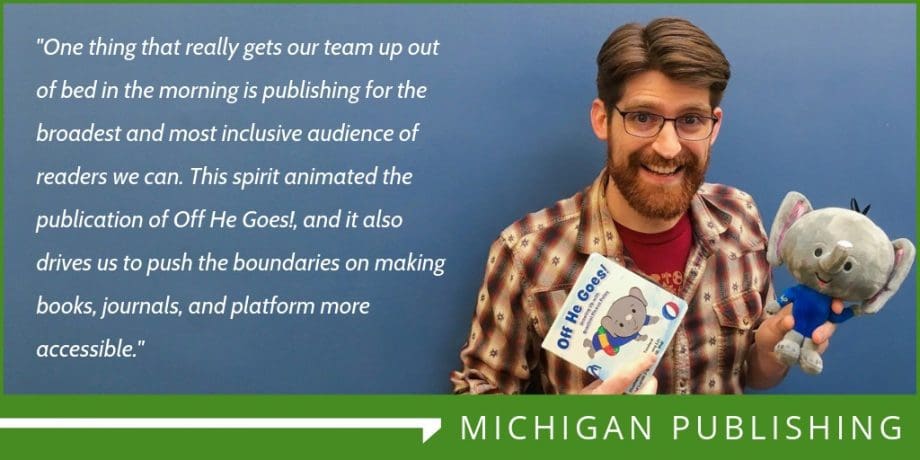In February 2019, we are publishing our second series of member profiles. These profiles showcase the wide variety of publishing work happening at member institutions, and celebrate our community’s contributions to the wider publishing landscape. This series will also spotlight resources the profiled institutions have contributed to the Shared Documentation library. Many thanks to the members who volunteered to answer our questions! See all of the published profiles, and look for a new one each week in February.
To learn more about their program, check out the University of Michigan’s latest Library Publishing Directory entry.
Tell us a bit about your publishing program.
Michigan Publishing brings together the University of Michigan Press, Michigan Publishing Services, and the Deep Blue data and document repository into one big publishing team. Our home is in the Buhr Building, which is an old ball bearing factory that also holds a few million library books and could double as a labyrinth. Every year, we publish about 125 books, 30 journals, and thousands of documents and datasets. We’re also the production and distribution arm of Lever Press, an author-fee-free Open Access publisher of peer-reviewed scholarly works that resonate with the mission of liberal arts colleges, and we’ve spent the last few years building a publishing platform, Fulcrum, with support from the Andrew W. Mellon Foundation. We’re pretty busy these days, but we do still find time for the occasional pun battle.
Tell us something you have accomplished with your program that you’re proud of – big or small.
We recently launched the University of Michigan Press’s eBook collection (more than 1,000 books) on Fulcrum, our digital platform. It was a ton of work for folks across the whole organization and we’re really proud of the finished product.
On a more whimsical note, we just published our first board book, Off He Goes! – it’s for kids who have a medical condition called Brachial Plexus Palsy, and was put together by a neurosurgeon at Michigan Medicine. The project brought us our very first plush toy tie-in, Wimbo the Elephant!

Looking ahead, what are you excited about, or what’s on the horizon for your program?
One thing that really gets our team up out of bed in the morning is publishing for the broadest and most inclusive audience of readers we can. This spirit animated the publication of Off He Goes!, and it also drives us to push the boundaries on making books, journals, and platform more accessible. Fulcrum aims to meet WCAG 2.1 AA standards, and we’re committed to having all University of Michigan Press books published in Fall 2019 and after having basic textual descriptions of images (alt text). By June 2021, all titles the Press publishes will have complete textual descriptions of images (alt text and, when applicable, long descriptions) supplied by our authors. Our Journals program is also doing important work in this area, including working with scholars at Gallaudet University to publish the Deaf Studies Digital Journal, which contains many video-based articles in American Sign Language.
Tell us about an obstacle you are facing in your work or one that the field is facing as a whole.
We’re trying to figure out the best ways to make our books and journals as easily discoverable as those published by larger commercial operations, and how to build workflows that make partnerships (such as those with Project MUSE, DOAJ, OCLC, or JSTOR) for discovery sustainable by a small team with a wide variety of types of publications (some including multimedia and data) and modes of access. Our books and journals won’t be read or cited if we don’t solve this problem well.
Tell us about your experience participating in the community of library publishers. Has that experience influenced you or your work?
The LPC community has been a wonderful place to share practice and reignite our enthusiasm for the work we’re doing as a library publisher. Serving on LPC committees has given us a voice and a point of contact with our peers, and those of us who attend the Forum every year always come away energized and reconnected with our work.
Tell us about a resource you have contributed to the Shared Documentation library. How has it been useful internally? What made you decide to share it?
Our Project Proposal form is a brief (two page) document that potential book authors, journal editors, and other partners fill out as part of the vetting process we go through for new projects. We think it does a pretty good job of asking questions that help our partners think through their goals and needs, regardless of the format of their publication. We’d be happy to see it adapted and used elsewhere in the LPC community.
